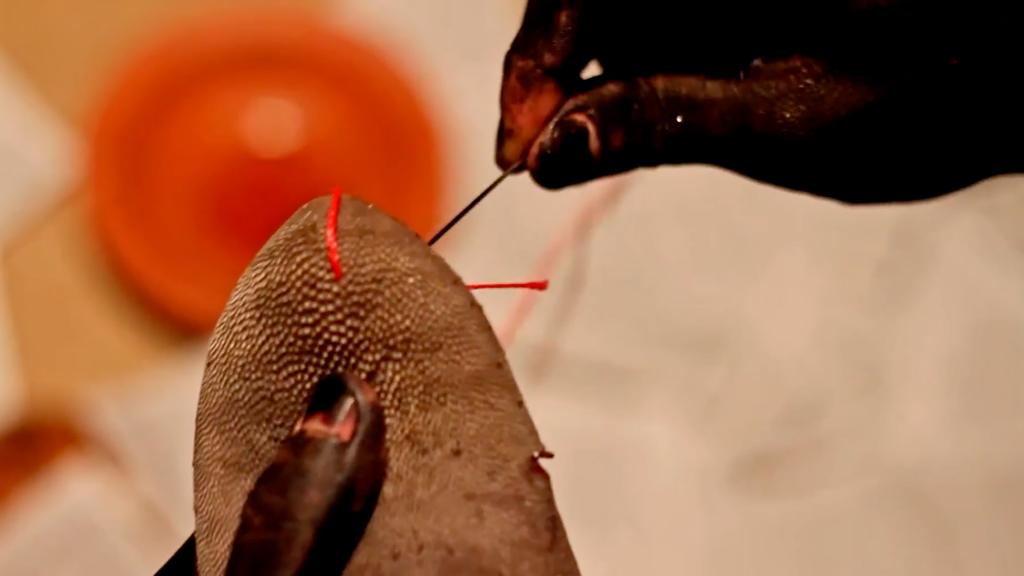- Programm
- /
- Filmreihen
- /
- No terra nullius
- /
- Autonomia e Direito
Autonomia e Direito
Im Anschluss an die Vorführung findet ein Gespräch statt, das von Ana Correa moderiert wird.
O verbo se fez carne (the verb became flesh)
Ziel Karapotó, Brasilien 2019, 7 Min. Portugiesisch mit englischen UT, digital
Os espíritos só entendem nosso idioma (The spirits just understand our language)
Cileuza Jemjusi, Robert Tamuxi und Valdeilson Jolasi, Brasilien 2019, 5 Min. Portugiesisch mit englischen UT, digital
A mãe de todas as lutas (The mother of all struggles)
Susanna Lira, Brasilien 2020, 84 Min. Portugiesisch mit englischen UT, digital
Inmitten der Wirren der brasilianischen Politik und der zahlreichen sozialen und Umwelt-Rückschläge, die die Geschichte extrem rechter Regierungen in Lateinamerika geprägt haben, leisten indigene Völker weiterhin Widerstand und werden dies auch weiterhin tun, um die Kolonisierung ihrer Länder und Körper durch den weißen Mann abzuwehren. Die aktuelle Situation vereint Menschen unterschiedlicher Rassen, Hintergründe und sozialer Klassen im Kampf um Land, um das Recht zu existieren und zu koexistieren, um Autonomie über ihre Bewegungen und um zukünftige Umweltkatastrophen zu verhindern.
Im experimentellen Kurzfilm "O verbo se fez carne" nutzt der indigene Künstler Ziel Karapotó seinen Körper, um fünf Jahrhunderte der Kolonisierung anzuprangern. In "Os espíritos só entendem nosso idioma" begegnen wir einem filmischen Gedicht in der beinahe ausgestorbenen Sprache des Manoki-Volkes im brasilianischen Amazonasgebiet. Abschließend zeigt "A mãe de todas as lutas" die Stärke weiblicher Führungspersönlichkeiten im Kampf um Land, wie Maria Zelzuita, Überlebende des Massakers von Eldorado do Carajás, und Shirley Krenak, deren Leben durch den Zusammenbruch des Fundão-Staudamms in Mariana, Minas Gerais, im Jahr 2015 verkürzt wurde, der den Rio Doce verwüstete.(TO)
Ziel Karapotó is originally from the Karapotó Terra Nova community, São Sebastião - AL, and has a degree in Visual Arts from the Federal University of Pernambuco. He is a multi-artist, cultural producer, curator, performer and audiovisual director. He has lived in Recife (PE) since 2015. He is a member of the research group "Science and Indigenous Art in the Northeast" (CAIN-UFPE) and an artist-researcher in the project "Cultures of Antiracism in Latin America" (CARLA-UFBA). Since 2021, he has been the general coordinator of the Karaxuwanassu Indigenous Association in Urban Context (ASSICUKA). His career is marked by productions and activities in the field of visual arts and audiovisual on the national and international stage.
Cileuza Jemjusi, Robert Tamuxi und Valdeilson Jolasi are young leaders of the Paredão village, of the Manoki indigenous people, members of the Ijã Mytyli Collective of Manoki and Myky Cinema, and “Os Espíritos Só Entendem O Nosso Idioma” is their debut work. The work was conceived at LISA (The Image and Sound Laboratory in Anthropology from the University of São Paulo).
Susanna Lira is a filmmaker with postgraduate degrees in Philosophy, International Law and Human Rights, specializing in criminal biopolitics. She has directed 15 feature films and dozens of shorts and series. Among her most notable films are: A Mãe De Todas As Lutas (2021), Prazer Em Conhecer (2020), Torre Das Donzelas (2018), Mussum, Um Filme Do Cacildis (2018), Legítima Defesa (2017), Clara Estrela (2017); Intolerância. Doc (2016); Mataram Nossos Filhos (2016); Levante! (2015); Damas Do Samba (2015); Porque Temos Esperança (2014); Uma Visita Para Elizabeth Teixeira (2011); Positivas (2010); Contracena (2009); Câmera, Close! (2005). She has a long and renowned career as a director, and has even been honored in several countries: at the Mar del Plata Independent Film Festival 2016 in Argentina, with the exhibition "Susanna Lira - Hasta el limite"; at the Tenemos que ver Festival in Uruguay in 2018 and at the FEMCINE Festival in Chile in 2019.
Ana Catalina Correa is a visual anthropologist and archaeologist whose research revolves around the intersections of art, materiality, and narratives. Her expertise spans historical, social, and media research, complemented by experience in museum and art collections management. Ana's significant contributions include her involvement in the Narcolombia project, where she explored the circulation of images within the frame of Narco-aesthetics, and the Topographies of Power project, investigating materialities and narratives at the National Police Museum in Bogotá, Colombia. She holds a Bachelor's degree in Anthropology from the University of the Andes and completed her Master's degree at HMKW. Ana's passion for research extends to sharing her knowledge as an assistant professor at the Department of Anthropology, Universidad de los Andes, as well as serving as an associate researcher at Universidad Alberto Hurtado and coordinating the Social Conflict and Violence Group at the National University of Colombia.
